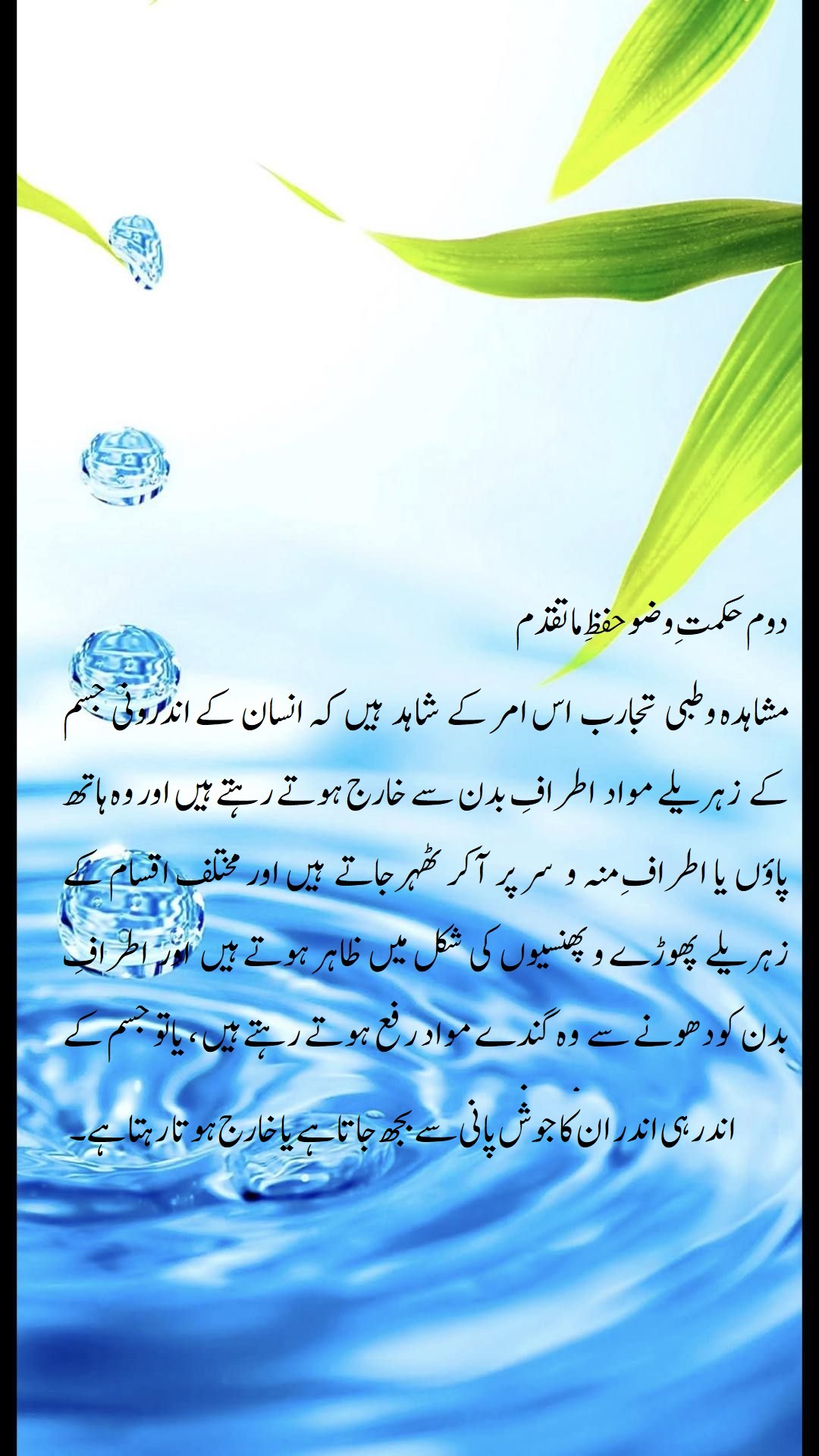Wudhu and Preservation of Health
Translation and Explanation of the Text
Title: The Second Wisdom of Ablution (Wudhu) is the Preservation of What Has Preceded (i.e., Health)
Text:
“Observation and physiological experiences bear witness to this fact that the toxic substances from the internal body are constantly expelled towards the extremities. They reach and settle on the hands, feet, and the areas around the face and head, and appear in the form of various types of toxic boils and pimples. And by washing the extremities of the body, these foul substances are continually removed. Either their inflammation is quenched internally by the [effect of] water, or they are expelled [from the body].”
Detailed Explanation
In this segment, Hazrat Thanwi (Rahmatullahi alayh) moves from the spiritual wisdom of Wudhu to a profound physical and medical wisdom. He explains how this act of worship, ordained by the Divine Lawgiver, serves as a means of preserving human health.
- The Physiological Process Described:
Hazrat Thanwi describes a process recognized in both traditional and modern understandings of health:
-
- The body’s metabolism produces waste and toxins.
- These “toxic substances” (زہریلے مواد) are often pushed away from the vital organs towards the body’s “extremities” (اطرافِ بدن)—specifically the hands, feet, and the highly vascularized areas of the face and head.
- If not removed, these substances can manifest on the skin as “toxic boils and pimples” (زہریلے پھوڑے و پھنسیوں), which are signs of the body trying to expel impurities.
- Wudhu as a Natural Cleansing Mechanism:
The act of performing Wudhu—washing the hands, mouth, nose, face, arms, and feet—directly addresses this physiological process.
-
- Mechanical Cleansing: It physically washes away these expelled toxins and impurities from the skin’s surface before they can accumulate and cause infections or block pores.
- Internal Effect: Hazrat Thanwi also alludes to a deeper, regulatory effect. The stimulation of nerve endings and blood vessels in these extremities through the action of water can help “quench the inflammation” internally. This aligns with modern concepts where hydrotherapy (water therapy) can improve circulation and support the body’s natural detoxification processes.
- The Wisdom of the Prescribed Limbs (تحدید الاعضاء):
The Shariah did not prescribe washing just any body part. It specifically mandates washing those very extremities where, as Hazrat Thanwi explains based on the medical knowledge of his time, toxins tend to concentrate and exit. This is a powerful indication of the divine wisdom embedded in the Shariah, which perfectly aligns with the natural functioning of the human body (Fitrah).
Summary in Simple Terms:
Allah Ta’ala, in His infinite wisdom, has commanded us to wash specific parts of our body multiple times a day for Prayer. One of the great physical benefits of this is that it keeps us clean and healthy.
Our bodies naturally get rid of waste and germs, and many of these come out through the skin on our face, arms, and feet. If we let them build up, we can get skin problems like pimples and boils. Wudhu acts like a regular, thorough cleaning routine. It washes these harmful substances away.
Furthermore, the soothing effect of the water helps calm the body from the inside. So, this simple act of worship is not only a purification for Prayer (Salaah) but also a divinely prescribed health practice that maintains our physical well-being.
This insight beautifully demonstrates how the Shariah seamlessly integrates spiritual purification with physical hygiene, catering to the holistic well-being of a human being.
May Allah Ta’ala grant us the ability to appreciate the profound wisdom in every command of the Shariah. Ameen.
(Khairun Nisa)

